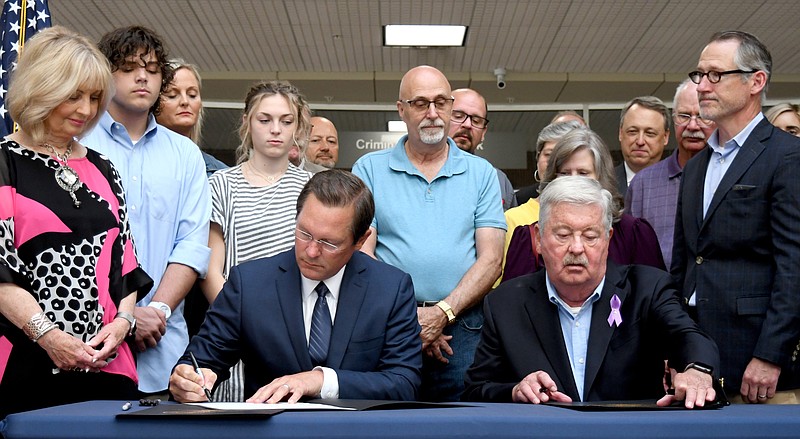It isn't often that we agree with Tennessee Gov. Bill Lee. But when the governor -- a man who campaigned in part on helping those incarcerated find jobs and a way to live right -- quietly refused to sign the Truth in Sentencing bill into law, we were with him.
He didn't veto the law because he apparently could see the simple math: The Republicans behind the obtuse and expensive legislation had enough votes to embarrassingly override such a move.
So when a new spate of grisly shootings in Memphis shook the state and nation, those lawmakers doubled down on their "tough on crime" talk just ahead of November elections.
"Tennessee House, Senate speakers vow more legislation cracking down on violent crimes amid Memphis slayings," read the headline in the Chattanooga Times Free Press, referring to the slaying of a mother of two killed after she was abducted during her Friday morning jog and the unrelated shooting spree in that same city on Wednesday that left four dead and three wounded. Recently released felons face charges in both cases.
In the TFP article, our state's top Republican legislative leaders said they want to double down on this year's "Truth in Sentencing" law and press more and new measures targeting violent criminals
The Truth in Sentencing law requires people convicted in eight categories of violent crime -- including attempted first-degree murder, second-degree murder and carjacking -- to serve 100% of their court-imposed sentences. It allows people convicted of 20 other violent offenses to serve at least 85% of their sentence before they could be considered for parole.
"I think it points out the fact that we do need the law and possibly need to expand the law," Lt. Gov. Randy McNally told reporters in Nashville. "And we'll look at that in the upcoming session. But there's people that are in jail that get out early due to a number of different factors, and we need to explore them all."
McNally and House Speaker Cameron Sexton cited plea bargains with prosecutors as one area to explore.
"Now, is that the end all to end crime in our state? No, it's not. It's a very great first step," said Sexton.
If you followed all this Memphis news and subsequent lawmaker sabre rattling, you likely noted the dearth of any talk about better regulating guns. And you'd not have heard that from Lee either.
In fact, after two mass shootings here in Chattanooga on Memorial Day weekend and the next weekend, as well as the aftermath of a gunman killing 19 in a Uvalde, Texas, elementary classroom, Lee himself doubled down, saying he did not support restricting firearms or strengthening gun control laws.
It was Lee, after all, who pushed through Tennessee's permitless carry gun law -- something on which we absolutely did not agree with him.
But Lee did push back this week on McNally's and Sexton's post-Memphis assertions that Tennessee should go further on sentencing crackdowns.
"To me, Memphis is seeing evil -- and innocent lives have been lost to senseless murders," Lee told reporters Thursday. "Those who committed these crimes, these heinous crimes, will be brought to justice, and it should be swift and severe. And our hearts and our condolences to the families, the victims of these terrible crimes.
"But," the governor said, "it is important that we work on proven crime preventions and make sure that we get ahead of these events in the future."
Noting violent crime has increased not only in Memphis but across the state and nation, Lee said we need to look at reducing recidivism to reduce crime.
"We need to clearly be tough on crime, we cannot be soft on crime," he said. "We can be smart on crime. And there's a way to do both of those."
He said that's why his administration invested $100 million in the last budget for the Violent Crime Intervention Grant Fund.
The funding is available to law enforcement agencies across the state to invest in "evidence-based" programming and resources, including community violence intervention programs. Lee noted his 2020 criminal justice legislation requires "supervision for everyone who gets out, mandatory supervision."
That provision didn't apply to the two men accused in the Memphis cases because they were convicted years before his law was passed, Lee said.
Similarly, the Truth in Sentencing provisions didn't apply to them.
You know what would apply to them?
Making sure they'd never -- ever -- had guns.
